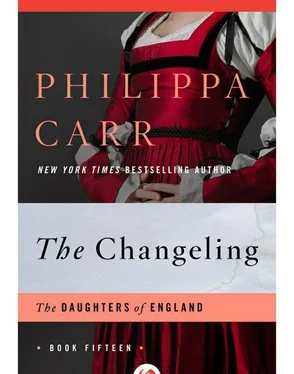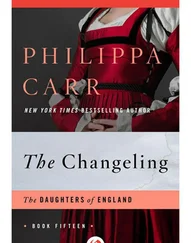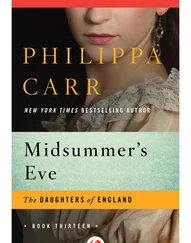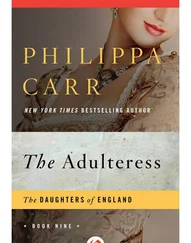The girl had risen. I thought she was going to burst into tears.
“I only wanted …” she began.
“Out!” cried Mrs. Polhenny. “Out, I say!”
My grandmother cut in. “Wait a moment. What does this mean? Tell me what’s going on.”
The girl shot past us and ran out of the church.
“You may well ask,” said Mrs. Polhenny. “It’s one of the sluts from Bays Cottages.” Her eyes narrowed and her lips tightened. “And I don’t mind telling you she’s six months gone.”
“Her husband.
Mrs. Polhenny laughed mirthlessly. “Husband? Her sort don’t wait for husbands. She’s not the first in that lot, I can tell you. They’re bad, through and through. It’s a marvel to me that the Lord don’t smite them on the spot.”
“Perhaps He feels more kindly towards sinners than some mortals do.”
“They’ll come to judgment, never fear.” Mrs. Polhenny’s eyes glittered as though she were already seeing the girl writhing in the flames of hell.
“Well, she was here in church,” said my grandmother. “She must have been repenting, and you know there is great joy over sinners who repent.”
“If I were the Lord,” said Mrs. Polhenny, “I’d do something about them Bay Cottages, that I would.”
“Perhaps some have to be thankful that you are not the Lord,” retorted my grandmother somewhat tartly. “Tell me about the girl. Who is she?”
“Daisy Martin. A bad lot, that family. The girl’s grandmother called me in. She’s repented her ways … getting old and frightened of what’s to come, I shouldn’t wonder. Wanted me to take a look at the girl. I said, ‘She’s six months gone and what about the man?’ She said it was one of them farm laborers who came on to help with the thatching. The girl’s only sixteen. Disgraceful, I call it.”
“But you’ll deliver the child, of course.”
“I have to do that, don’t I? ’Tis my work, and if a baby’s been planted, however sinfully, it’s my duty to bring it into the world. God sent me here to do this work and nothing would stop me.”
“I’m glad of that,” replied my grandmother. “We must not visit the sins of the parents upon the children, you know.”
“Well, they’re God’s children, however they’ve been come by. As for that creature … I hope they cast her out … once the child’s born. It does the neighborhood no good to have her sort about.”
“She’s only sixteen, you say.”
“Old enough to know better.”
“She’s not the first, by any means.”
“So much for the sinful ways into which we have fallen.”
“There is nothing very new about these things, you know,” said my grandmother.
“The Lord will take His vengeance,” Mrs. Polhenny assured us, looking up to the rafters as though to Heaven—giving the Lord a little prod, I thought, to remind him that He was being lax in performing His duty.
I knew my grandmother was torn between the pity she felt for the wayward young Daisy and the secret pleasure she derived from baiting Mrs. Polhenny who went on: “The goings on at Poldorey … East and West … well, it would give you a bit of a shock, I reckon, if you knew all.”
“Then I suppose I should be thankful to remain in ignorance.”
“The Lord will take His vengeance one day … mark my words.”
“I can hardly see East and West Poldorey as Sodom and Gomorrah.”
“It’s coming, you’ll see.”
“I hope not. But what I do see is that we are holding up your work. We’ll say goodbye, Mrs. Polhenny.”
We stood outside the church and my grandmother breathed deeply, as though she needed fresh air after the atmosphere iii the church.
Then she turned to me and laughed. “What a self-righteous woman. I’d rather have a sinner any day. Oh well … she’s an excellent midwife. There isn’t a better in the whole width and breadth of Cornwall. My dear, we must look after that poor girl. I’ll go along to the cottages tomorrow and see what I can find out.”
She seemed suddenly to remember my age, and possibly it occurred to her that I was being introduced to the facts of life before I was ready to absorb them.
She went on: “We’ll go over to Pencarron this afternoon. Isn’t it wonderful that you have Pedrek here with you?”
I thought a lot about Mrs. Polhenny and always scrutinized her cottage closely when I passed by. It was just outside East Poldorey and often I would see clothes drying on the bushes. There were lace curtains at the windows, spotlessly clean, and the stone steps leading to the front door were regularly scrubbed. She obviously believed that cleanliness was next to godliness; and saw herself as an upholder of both virtues.
Once or twice I glimpsed Leah at a window. She would be there with her embroidery frame, stitching away. Sometimes she looked up from her work and saw me. I would smile, wave my hand, and she would acknowledge my greeting.
I should have liked to talk to her. I wanted to know what it was like living with a mother such as Mrs. Polhenny. But she always gave me the impression, if ever I hesitated, that she must get on quickly with her work.
Poor Leah! I thought. It must be hard to be the daughter of a saintly woman who, as she felt it her duty to uphold the morals of the countryside, must be much more strict in her own home.
I thanked God for my mother, my grandparents and the Pencarrons. They might not be so concerned with the laws of God but they were much more comfortable to live with.
So that summer passed as others had. My grandmother visited Bays Cottages and took clothes and food for the young girl; Mrs. Polhenny delivered a healthy boy in due course and my grandmother affirmed that, however irritating she was in other ways, she knew her job and mothers were safe in her hands.
I seemed to see Jenny Stubbs more frequently that year. Perhaps it was because I noticed her more. I would see her in the lanes. She worked for one of the farmers’ wives and I heard she was a good worker. They all humored her, it was said, and Mrs. Bullet, the farmer’s wife, made sure none of the other workers teased her or disillusioned her as to her state. “It does no harm to none,” said Mrs. Bullet, “so let the poor soul have her fancies.”
So Jenny, singing in her reedy off-key tone and Mrs. Polhenny preaching righteousness wherever she went … that was what I remembered most from that Last Summer.
And now, looking back, that seems somehow significant.
It is all so clear to me; waving goodbye to the grandparents, which was rather sad in a way. I tried to hide from them the excitement I felt at the thought of seeing London again.
“I wish,” I said to Pedrek, “that we could all live close together.”
He had the same problem. His grandmother was almost in tears at his departure. Like myself, he wanted to show how sad he was and yet he could not hide his eagerness to be reunited with his parents. The similarity of our positions had always drawn Pedrek and me closer together.
Then we were speeding back to London.
Pedrek’s parents were at the station to meet us. It was the usual ritual. If I had been travelling with his parents, my mother would have been there. There is something very comforting about normality which I did not appreciate until it ceased to be there.
We drove back to our house first where we would have tea before the Cartwrights went off to their place only a few streets away, taking Pedrek with them.
Innumerable questions were asked and Pedrek and I talked happily about what we had done in Cornwall.
We were all sitting at the table—Miss Brown and Pedrek’s tutor with us—when a visitor arrived.
“Mr. Benedict Lansdon!” announced Jane with more dignity than was customary with her. And there he was—very tall and with what I can only describe as a commanding presence.
Читать дальше












